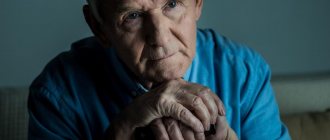Consequences and complications
The main and most terrible consequence of depression is suicide.
If such thoughts appear, you should immediately seek help from a specialist. It's worth at least calling the suicide prevention hotline. An equally serious consequence is the loss of professional and social life. If you refuse to communicate with people, the connection with them is gradually lost, and it will be difficult to restore it. Due to changes in behavior and character, loved ones often refuse to talk to the patient, not understanding the reasons for his actions and words.
With prolonged apathy, loss of strength, drowsiness or headaches, you have to suspend professional activities. If this condition drags on over time, there is a risk of losing qualifications or being expelled from the educational institution.
Exhaustion can also be a consequence of depression. If a person refuses food for a long time, his body begins to work differently. After a certain period of time, it will be difficult for him to start eating again. Due to a lack of nutrients, problems with hair, nails, bones, as well as metabolic and endocrine disorders will occur. Therefore, it is important to ensure that a depressed person eats. To do this, you can choose your favorite foods or those that are easier and faster to eat, and compensate for the lack of nutrients with medications.
Symptoms of reactive depression
How do you know if your depression is reactive or endogenous? The easiest question to ask yourself is: how many things in your life irritate you and can you explain why?
If in response to this question you can spend hours talking about how someone annoys and annoys you, how you hate your job and co-workers, how your husband doesn’t pay attention to you and your children don’t listen, then your depression is probably exogenous in nature, that is, is a reaction to external events.
Symptoms of depression usually include:
- constant feeling of fatigue, apathy;
- loss of interest in activities that previously made you happy, inability to get pleasure from something;
— sleep disorders (constantly want to sleep or insomnia, especially if you wake up at night and cannot fall asleep);
- appetite disturbances (you began to eat more or less than before, gained or lost weight);
- irritability;
- Difficulty concentrating.
Diagnostics
It is impossible to independently diagnose reactive depression, since a person often loses criticality when assessing the situation. But you can take the Beck test if you have warning symptoms. If the result shows depression, you should seek help from a psychotherapist.
A clinical psychologist can diagnose depression. If you are afraid of doctors, this is an excellent alternative for examining a person. The psychologist will see the problem and motivate you to contact a psychotherapist by writing a referral to a specialist.
A comprehensive examination will help to distinguish reactive depression from endogenous, that is, caused by pathologies of internal organs.
Necessary tests:
- assessment of thyroid function: determination of the level of free T3 and T4, TSH, Anti-TPO (antibodies to thyroid peroxidase);
- diagnosis of iron deficiency: complete blood count, assessment of ferritin concentration;
- determining the level of vitamin D in the blood;
- assessment of the concentration of sex hormones.
If the results reveal no problems, but there is a depressive disorder, it is reactive depression.
Psychogenic depression
Reactive (psychogenic) depression represents a wide range of disorders, the occurrence of which is associated with the adverse effects of psychosocial stress.
The properties of mental trauma most often take on events (“blows of fate”), which, even outside the framework of mental illness, cause depressive reactions. Although these may be short-term situations, they seriously affect the individual, especially due to the individual significance of the experiences. First of all, we are talking about irreversible losses - death of relatives, divorce, breakup or separation from a loved one.
The cause of reactive depression can be a major conflict at work, material losses - financial collapse, bankruptcy, etc. Short-term situations that can cause reactive depression also include situations that suddenly violate a person’s main goals (career collapse, sudden change in lifestyle, arrest, etc. .).
Psychogenic depression can occur in a person who is ready for an increased response to a certain situation, due to the fact that in the past a similar situation was difficult to experience.
Reactive depression is especially often formed in situations of long-term traumatic influences (conflicts in social relations, frequent family quarrels, sexual conflicts). Situations with weak but long-lasting traumatic effects, characterized by prolonged mental stress, the need to constantly restrain oneself (in the family or at work), and increased responsibility can provoke the development of reactive depression.
The largest stressors that most often precede the onset of psychogenic depression usually include: adultery, mental disorders of the spouse, divorce from him, his death. Men are more likely than women to experience depression after the death of a marriage partner. The latter circumstance is probably due to the fact that women, to a greater extent than men, are able to share personal experiences with other people. Depression can appear after the death of a child or children leaving home. A protracted judicial investigation situation can also contribute to the formation of depression.
An important feature of reactive depression is the concentration of the entire content of consciousness on traumatic ideas that acquire a dominant character. For the formation of psychogenic depression, along with psychotraumatic and situational influences, some other factors are also important - constitutional predisposition, hereditary burden of depression, age, cultural characteristics, concomitant mental illnesses and diseases of internal organs
Based on the duration criterion, short-term (no more than 1 month) and prolonged (from 1-2 months to 2 years) depressive reactions are distinguished.
| Find out more: Inpatient treatment for depression |
Acute depressive reactions are most often directly related to the misfortune that has occurred, the sudden impact of an individually significant mental trauma. Acute depression can debut following transient manifestations of an affective-shock reaction (anxiety, aimless tossing or motor retardation, psychogenic amnesia) and be combined with hysterical symptoms. At the height of affective disorders, deep despair, fear, thoughts of death, sleep and appetite disturbances dominate. Such conditions, as a rule, are short-lived and come to the doctor’s attention only when they are associated with self-harm or suicide attempts.
Prolonged depressive reactions often occur in connection with a prolonged stressful situation. If the stress situation persists, the process of recovery from depression is also delayed. Occasionally, depression can be interrupted by a strong mental experience, much more intense in its severity than the protracted state of chronic depression.
The clinical picture of prolonged reactive depression is characterized by depression, feelings of hopelessness, disappointment, tearfulness, and sleep disturbances. In this case, the spectrum of manifestations of depression becomes wider than in acute depressive reactions. Along with depression, tearfulness, a gloomy, pessimistic vision of the future, asthenic, asthenovegetative and hypochondriacal manifestations are more common.
Depressive reactions are characterized by a concentration of consciousness on the events of the misfortune that happened. The theme of the experience acquires the properties of dominant ideas. Patients are consumed by painful memories. They constantly, against their own will, reproach themselves for not taking measures to prevent misfortune, not providing qualified assistance to a loved one, not doing everything possible to alleviate his suffering, and poorly caring for him. The content complex of depression does not completely disappear, even when the depression becomes protracted and more erased. An occasional reminder is enough to cause depression to temporarily increase again; even distant associations can provoke an outburst of despair. If during the day patients manage to be distracted by their business, then at night the drama they experienced continues to emerge for a long time in nightmares.
As stress disappears, the symptoms of depression are usually completely reduced, leaving no changes behind, but in some cases there is a tendency to include internal factors in the pathological process. Manifestations of a psychogenic reaction in this case gradually acquire the properties of endogenous depression.
In the process of differential diagnosis of psychogenic depression from recurrent depression, attention is paid to hereditary burden; experiences reflecting a traumatic situation; the development of depression after mental trauma, especially against the background of current chronic somatic diseases. The severity of psychogenic depression, as a rule, depends on the nature of the mental trauma and the patient’s susceptibility, and the dominant depressive ideas are associated with the events of the misfortune that occurred. These ideas often do not disappear even when the depression becomes protracted and worn out. Previously, it was believed that in reactive depression, depressed mood is somewhat more likely to intensify in the evening (diurnal fluctuations in affect, typical for endogenous depression, are usually less pronounced in psychogenic depression). It should be noted that during psychogenic depression, despite low self-esteem, awareness of the disease is preserved in most cases. Psychomotor reactions are not impaired, however, due to asthenia and exhaustion, by the end of the conversation with the patient, the slowness of his speech increases. Psychogenic depression is not characterized by vital manifestations of depressive affect, feelings of guilt are often directed not at oneself, but at others, suicidal intentions are not typical, and if they occur, they are often motivated from the position of painful depressive logic. When purposefully questioning the patient, he does not hide thoughts of suicide and talks about them in detail. Psychogenic depression is often accompanied by tears, and its symptoms are particularly sensitive to psychotherapy.
Return to Contents
Treatment
In many cases, you can get rid of depression without medication. This is especially true for light and medium flows. With quality work with a psychotherapist and following all recommendations, recovery occurs even without pharmacotherapy.
Important points:
- daily routine – getting up and going down at the same time every day;
- healthy eating and avoiding fatty, heavy foods;
- giving up bad habits - smoking and drinking alcohol;
- maintaining sleep hygiene - remove gadgets 1-1.5 hours before, change activities to calm and monotonous ones;
- try to increase physical activity;
- find a new hobby;
- keep a gratitude diary for yourself and write down everything that you managed to do, including waking up, household chores, etc.
In severe stages or bipolar depression, medication support is required. Antidepressants increase activity, and lithium drugs help control manic phases. The dosage is selected gradually and individually for each patient. A noticeable effect appears after at least 2 weeks of use. Typically treatment lasts from 4 months to several years. Sometimes drug support is required throughout life.
Hospitalization to a hospital is carried out in exceptional cases when an increase in the patient’s activity can lead to suicide attempts. In this case, strong sedatives can be used together with antidepressants.
For successful treatment, it is important to support the person and treat him kindly. It is necessary not to devalue his experiences and well-being, even if the problems seem insignificant. Help from others significantly speeds up treatment and improves the quality of life of a person with depression.
Spontaneous recovery occurs in only 10% of people. More often the condition worsens or becomes chronic. In this case, longer and more serious treatment will be required, so it is better to start therapy in the early stages.
Treatment of reactive depression
If you have reactive depression, you don’t need to take pills, but you can sign up with a psychotherapist and regularly tell him about your problems for a while, as a result of which after some time they will begin to go away, along with depression.
A person does not always see for himself that he is not satisfied with something specific in life. He may think that everything is fine and that he feels unhappy for completely inexplicable reasons. In this case, a psychotherapist can usually tell in 1-2 meetings whether he considers your depression to be endogenous (and refer you to a doctor for antidepressants), or whether he believes that you can do without medication, and even express his opinion about why you feel feeling so unhappy.
What is psychotherapy for depression? These are conversations about what worries you most right now. Some people find it helpful to simply talk about their worries to an attentive listener. For others, it is important to find solutions to problematic issues, restore a sense of joy and meaning in life, change their behavior or improve mutual understanding with loved ones. Both problems can be solved by psychotherapy in the process of treating reactive depression.
Help from a psychologist for depression
Prevention
The best prevention for reactive depression is proper treatment of the first episode. The cognitive-behavioral method of psychotherapy allows not only to get a person out of this state, but also to teach him how to act if it happens again. Patients who receive this treatment are less likely to have relapses.
The support of loved ones, understanding and acceptance of the person will help you avoid reactive depression. There is no need to devalue experiences, even if their cause seems insignificant. Helping to understand feelings, name them and experience them is the best thing that can be done for a person under severe stress. It is worth communicating with him more, involving him in joint activities, offering active activities. All this will allow you to experience stress more smoothly and reduce the risk of depression.
Bibliography
- Avdeev D.A. Depression is both a passion and a disease. M.: Mir, 2002. p. 195.
- Bleuler E. Guide to Psychiatry. Publishing House of the Independent Psychiatric Association, 1993. p. 215.
- Wayne A.M. Depression in neurological practice. M.: Medical Information Agency, 2002. p.160.
- Vertogradova O.P. Depression: psychopathology, pathogenesis. M.: MSU, 1980
- Dannikov N.I. Insomnia, depression, neurosis. M.: Ripol Classic, 1997. p.240.
- Romanov I.A. New in the treatment of depression. M.: CheRo, 2001. p.40.
- Shirman A. Depression and methods of its treatment. M.: Dekont Plus, 1998. p. 110.
- Mosolov S.N. “Diagnostics and taxonomy of depressive conditions”, 1987
- Tkhostov A.Sh. Psychological concepts of depression. // RMJ. - St. Petersburg, Volume 1/No. 6/1998.








